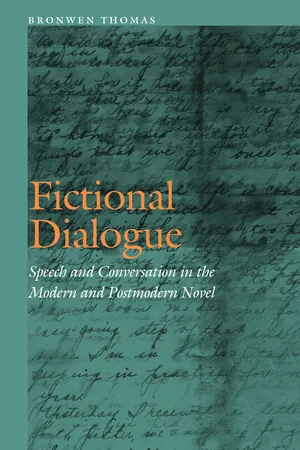
Fictional Dialogue
Speech and Conversation in the Modern and Postmodern Novel
- 280 pages
- English
- PDF
- Available on iOS & Android
About this book
Experimentation with the speech of characters has been hailed by Gérard Genette as "one of the main paths of emancipation in the modern novel." Dialogue as a stylistic and narrative device is a key feature in the development of the novel as a genre, yet it is also a phenomenon little acknowledged or explored in the critical literature. Fictional Dialogue demonstrates the richness and versatility of dialogue as a narrative technique in twentieth- and twenty-first-century novels by focusing on extended extracts and sequences of utterances. It also examines how different versions of dialogue may help to normalize or idealize certain patterns and practices, thereby excluding alternative possibilities or eliding "unevenness" and differences.
Bronwen Thomas, by bringing together theories and models of fictional dialogue from a wide range of disciplines and intellectual traditions, shows how the subject raises profound questions concerning our understanding of narrative and human communication. The first study of its kind to combine literary and narratological analysis with reference to linguistic terms and models, Bakhtinian theory, cultural history, media theory, and cognitive approaches, this book is also the first to focus in depth on the dialogue novel in the twentieth and twenty-first centuries and to bring together examples of dialogue from literature, popular fiction, and nonlinear narratives. Beyond critiquing existing methods of analysis, it outlines a promising new method for analyzing fictional dialogue.
Frequently asked questions
- Essential is ideal for learners and professionals who enjoy exploring a wide range of subjects. Access the Essential Library with 800,000+ trusted titles and best-sellers across business, personal growth, and the humanities. Includes unlimited reading time and Standard Read Aloud voice.
- Complete: Perfect for advanced learners and researchers needing full, unrestricted access. Unlock 1.4M+ books across hundreds of subjects, including academic and specialized titles. The Complete Plan also includes advanced features like Premium Read Aloud and Research Assistant.
Please note we cannot support devices running on iOS 13 and Android 7 or earlier. Learn more about using the app.
Information
Table of contents
- Title Page
- Copyright Page
- Contents
- Preface
- Acknowledgments
- Introduction
- Part I. Theory
- 1. Debates about Realism
- 2. The “Idea of Dialogue”
- Part II. Narrative Cornerstones
- Part III. Genre and Medium
- Conclusion
- Appendix
- Notes
- Bibliography
- Index